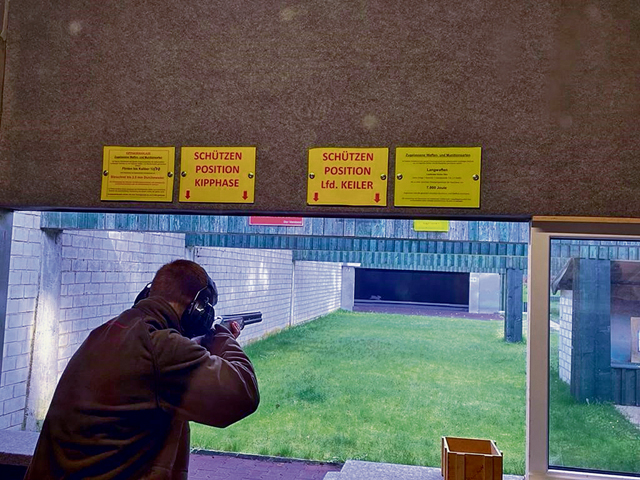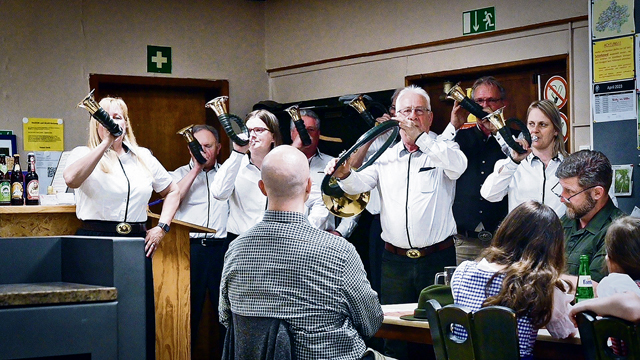
During a “knighting” ceremony that reaches back almost four centuries, 10 Americans earned honors as German young hunters, part of a regular recreational activity offered by U.S. Army Garrison Rheinland-Pfalz.
The conclusion of U.S. Forces Europe German Hunting Course 23-1 on April 28, followed almost three months of classroom work. The course — managed by the garrison Directorate of Family and Morale, Welfare and Recreation’s Outdoor Recreation team — is offered a handful of times during the year.
The course caught the attention of Air Force Staff Sgt. Kaden Norwood because his grandfather, a former Soldier stationed in Baumholder, finished it almost 70 years before.
“My grandpa was stationed here in 1954, and he got his Jagdschein (hunting license certificate). I have that hanging on the wall in my office,” said the Kansas native. “I also have a coworker who took the course and was pretty involved in hunting. That got me interested, so I found this course.”
The Course
In finishing, the 10 graduates could eventually join just over 350,000 Germans with hunting licenses, about 0.4 percent of the population who are able to hunt an area of German land — primarily owned privately or by cooperatives — about three times the size of Pennsylvania.
The course taught to Americans is an abridged version of the nine-month course taught to local-nationals. Offered six times annually in the Kaiserslautern Military Community, the hunting course is a minimum of 58 hours of instruction on firearms safety, range time, time at a local hunting area, species identification, basic animal biology, farming and forestry, and more.

Potential American students must clear an FBI background check, be 18 years old and buy a Hunting, Fishing, and Sport Shooting membership from Outdoor Recreation or the Kaiserslautern Rod & Gun Club. The German government offers the abridged version to American servicemembers since few stay in theater for more than two or three years.
Volunteer Brandon Cowell, a C-130 Hercules simulator instructor at Ramstein Air Base, assisted with instruction. Cowell — who assisted lead course instructor Beau Jager — has helped teach Americans to hunt in Germany since 2015.
“It’s a great privilege to be given the ability to use firearms in Germany. There’s so much paperwork and a lot of things that go into getting the license, but at the same time, the day students leave, they have 100 percent knowledge of how to get it done,” Cowell said.
According to many students, conservation is the most apparent theme that resonates throughout the course. Tyler Berry, a warrant officer with the 16th Sustainment Brigade in Baumholder, said the emphasis on conservation is what differentiated this from other hunting courses in the US. “There’s always discussion about how we can make the animals’ lives better and how can we improve this for the next person,” he said.
The Graduation
The knighting ceremony, or Jaegerschlag, is an event filled with music and tradition. The hunters dress in traditional lederhosen, the hunter’s hat (jagd hut), and other garb. The ceremonial meal served is as German as it gets — meat, potatoes, sauerkraut, fresh bread, and more. At the start, during, and after the ceremony, a group of horn blowers played tunes that signify greetings, the time to eat, the induction, and saying “until next time.”

During the knighting ceremony, students approach the Rheinland-Pfalz State Hunting Master Hubertus Gramowski in groups of three. Kreisjagdmeister Gramowski ‘strikes’ each graduate on the shoulder three times. The first strike is to appoint the graduate to the hunter’s guild. The second “is to give you the strength always to do what is right.” The third strike binds the student to “a true vow of huntsmanship.” When the students rise, Kreisjagdmeister Gramoski greets them with “Waidmannsheil,” the hunter’s greeting, to which the graduate responds, “Waidmannsdank.”
Kreisjagdmeister Gramowski also adorned the right side of their hats with a small pine branch marking their symbolic first kill and signifying their Jungjaeger (young hunter) status they will carry for at least three years. At course completion, graduates receive a Jaegerbrief and, eventually, after turning in all the paperwork to their local city hall, the Jagdschein — much like the one Norwood’s grandfather accepted 70 years before.
The enduring partnership & family traditions
Linda Sevigny works for the Department of Defense Education Activity and is the president of the cadre of volunteers, a group of about 13 people who organize and run the courses. They also support local hunting, fishing, archery, and sport shooting events sponsored by Army MWR and others in the region.
Sevigny and her husband, Ron, graduated from the hunting course and now serve as volunteer instructors. Her dad, a career Soldier, earned his Jagdschein while living in Germany during the 1950s and 1960s. She said she is honoring his memory and legacy as a hunter by serving as a volunteer instructor.
“My husband and I do this together to give back to the community and reinforce the emphasis on Conservation, which is near and dear to our hearts,” she said. “Per German hunting tradition, we’re conservationists first and hunters second, and that nourishes my soul!”
U.S. Army Col. Reid E. Furman, USAG Rheinland-Pfalz commander and one of those ‘knighted’ during the graduation, highlighted the opportunity to learn unique aspects of German hunting language and culture and join a German-American hunting and education partnership that has endured for decades.
“Earning the German Jadgschein is an incredible opportunity for U.S. service members. This course builds on centuries of hunting tradition and is recognized around the world as the gold standard for hunter education. We have incredible instructors and volunteers who continue to improve this course with our German partners,” Furman said. “And having Herr Gramoski here to officiate, along with the hornblowers, to conduct the ceremony is a tremendous honor that we will always remember.”







